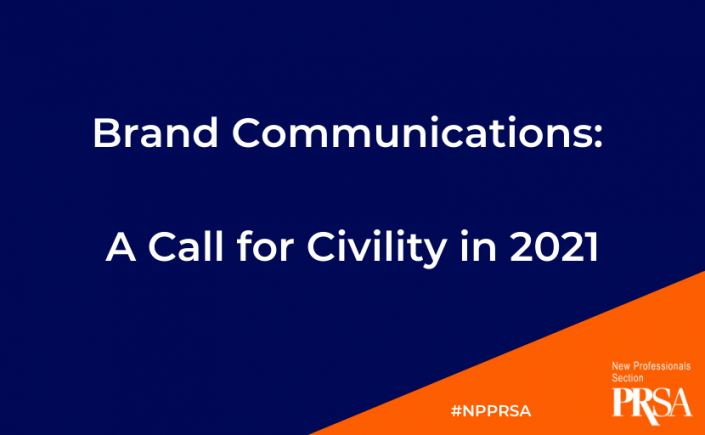2020 was a year that sparked change across all aspects of life and professions. As the world dealt with the COVID-19 pandemic, civil rights issues, natural disasters, ongoing wars, and more, it became apparent that the way we talk and communicate about these issues and workplace happenings would need to change.
While the last few years have seen a push for civility and authenticity in brands and communications, it became necessary in 2020 — and beyond.
In January of 2020, Stephen Dupoint, APR, wrote that people are growing angrier. Then in October, PRSA released a white paper from the Civility Task Force on “Modeling Civility: How Public Relations Professionals Can Restore Quality, Integrity and Inclusiveness to Civil Discourse.”
The white paper noted that degradation of civil discourse “permeates our interactions at work, at the dinner table, in our communities and online. It threatens the very thing that distinguishes us as a species: our ability to share our values and perspectives and thereby find ways to cooperate in vast numbers and increase our chances of collective success. It attacks the pillars of our economy, our health and safety, our national security and our civil rights. Most insidiously, children exposed to incivility at home emulate it and, ultimately, internalize it.”
As PR professionals, we have a professional and moral obligation to respond to this growing state of incivility. It is up to us to determine the language, tone and direction of how our organizations address the public.
In 2018 at the PRSA International Conference, Former Secretary of Labor Robert Reich said to PR professionals, “You are people who set the tone very much for what we, and how we, communicate…You have a great deal of influence over… the tone of our national communications. You have a great deal of influence over your clients, in terms of helping them to understand that civility—just merely being respectful—is critically important, and good for them. It’s good for your clients, as well as good for the country.”
As communicators, we have the power to interweave our private and public discourse with civility. As spokespeople, we choose the words our companies and organizations relay to our audiences. As PR professionals, we influence the tone by which communication happens. May we rise to the challenge and be advocates for civility.
Our 2021 PRSA Chair Michelle Olson, APR, calls for PR professionals to do just that: “I’m hopeful that PRSA and professional communicators can be the arbiters of better civil discourse in our communities, organizations and on social media. If not us, then who? We have the skillset to change the tenor of dialogue in America.”

